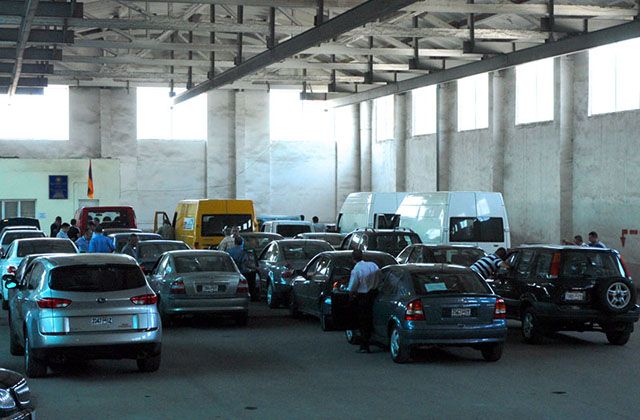Another Pop of Balloon of 170 million

Vakhtang Mirumyan, RA Deputy Minister of Finance, yesterday gave clarifications on value-added tax (VAT) paid for importing a vehicle from Eurasian Economic Union (EEU) member countries.
Note, Tatyana Valovaya, EEC Minister, stated that Armenia charges 20% VAT for import of vehicles to Armenia from Russia, however, it isn’t entitled to, as it contradicts EEU legal-contractual frame.
Of course, Valovaya was concerned with not the issue of Armenia’s ordinary citizens, who spend lots of money at customs clearance, but that of the vehicles’ flow to Armenia from EEU member countries might have been more, i.e. Armenia’s authorities obstacle export from EEU to Armenia.
A week later, Armen Alaverdyan, RA Deputy Minister of Finance, made an official statement, that in this regard Armenia didn’t record any deviation or omission; everything has been implemented out of state budget interests, in accordance with jurisdiction.
Then, RA Ministry for International Economic Integration and Reform appeared with a rather large comment on the topic. Seemingly, Vakhtang Mirumyan yesterday put an end to this conundrum. He stated, that under current legal field VAT is charged in Armenia in case of vehicle import from EEU member countries. However, according to his statement, in case of importing a vehicle from EEU member countries no VAT will be charged, as 1 January 2017 has been defined as a transfer period. It seems, the issue was closed by that, however, a deeper layer was hiding beneath, i.e. issues resulting from EEU membership, concealing of which is becoming more and more difficult.
This doesn’t refer to the issue, that we very deeply feel worsening of EEU major actor—Russia’s economic condition via decrease of transfers and other manifestations. Truly enough, our membership to EEU more deepened economic dependency from Russia, however, Armenia would have felt those negative signals on its economy, even if not engaged with the structure.
This refers hindrances on goods-service transfer, i.e. if it was estimated, that after membership all obstacles regarding trade turnover will be eliminated, and 170 million market would open its doors before our country, just the contrary happened in practice. Everything turned complicated, and our exporters faced serious issues.
The reason wasn’t only depreciation of Russian ruble, resulting which our production became uncompetitive in Russian market. Issue linked to VAT wasn’t less crucial.
Raffi Mkhchyan, Chairman of the RA Exporters’ Union, spoke of the issue yet a month ago. As a primary reason the latter mentioned ruble depreciation, which essentially affected Armenia’s businessmen. In an interview with Tert.am, he said tax authorities oblige exporters to submit a document, which would edify, that a foreign company that purchased goods from them paid VAT after purchase. “There hasn’t been such a precedent before and export was formulated as zero and tax was offset, but no offsetting is implemented now, until the buyer submits a reference. I also fight against this, I have raised the issue, in particular I talked to the Prime Minister before the New Year, and he promised, the issue would be solved, however, no changes have been recorded until now,” he said, adding that for the country no positive shifts have been recorded, not speaking of benefits for exporters.
Data of official statistics edify of exporters’ issues. In 2015 import from Russia to Armenia decreased by 15,6% and comprised USD 948 million. And export from Armenia to Russia reduced by 26,7%, comprising USD 225,9 million. That is, expectations, to put it mildly, weren’t justified. Moreover, RA Ministry for International Economic Integration and Reforms recently reflected to issues stated by the Chairman of the RA Exporters’ Union in its clarification on issue of VAT in importing vehicles from EEU member countries. “To implement VAT zero rate towards alienation deal on goods exported to EEU member countries, it’s necessary that exporter submitted the statement on import of goods and payment of indirect taxes to the tax authority to the place of his/her residence. Moreover, exporter should submit the statement in the period of 180 days following the day of official export from the territory of Armenia.
Otherwise, VAT tax duties are entitled to the exporter in accordance with order defined by the legislation (like in case of sale of goods in the territory of Armenia). However, it’s a fact that in practice, connected with submitting the abovementioned document, very often a range of issues emerge. Not often importers properly perform their duties, and conditioned by this, our exporters have to undertake additional tax duties, including penalties,” the statement read.
On the other hand, in case of importing goods to Armenia from EEU member countries, being sure, that Armenian enterprise will perform its tax duties and will submit the corresponding statement issued by tax authorities, the good is sold including VAT in the price for the good. Conditioned by this, in fact, double taxation by VAT occurs, and VAT is paid both in the country of export and in Armenia.
To be more simple, in any case, in trade relations with EEU we lose both in import and export.
For this, statement issued by the Ministry openly reads, that within Eurasian Economic Union this process is rather complicated and raises hindrances in the field of mutual trade, fairly originating difficulties among entities of our country.
The most ridiculous in all these is that instead of complaining from our side, EEU partners do it, i.e. we deal with selective approach. As national wisdom says ‘instead of the cart the carter is squeaking.’
On the other hand, every cloud has a silver lining. Discontent expressed by T.Valovaya will be an instigation, that issues of exporters were solved (which they promised to solve till the end of last year).
By Babken Tunyan

























